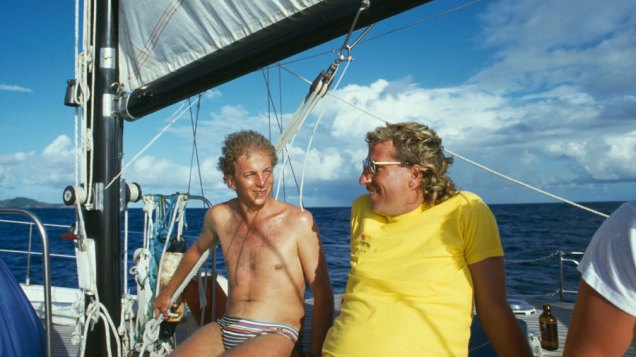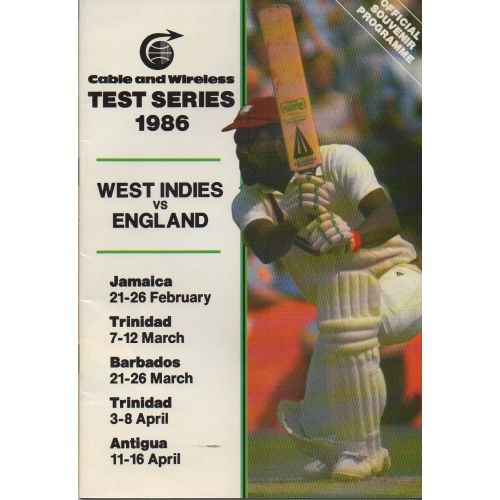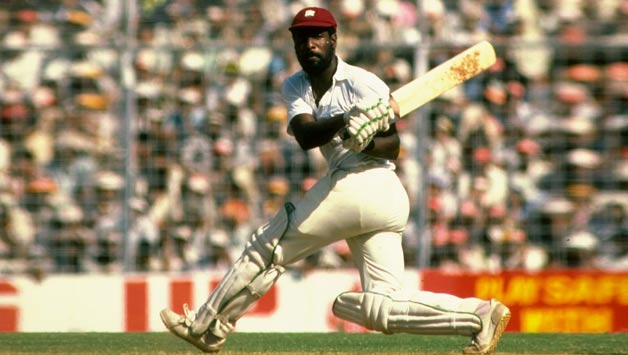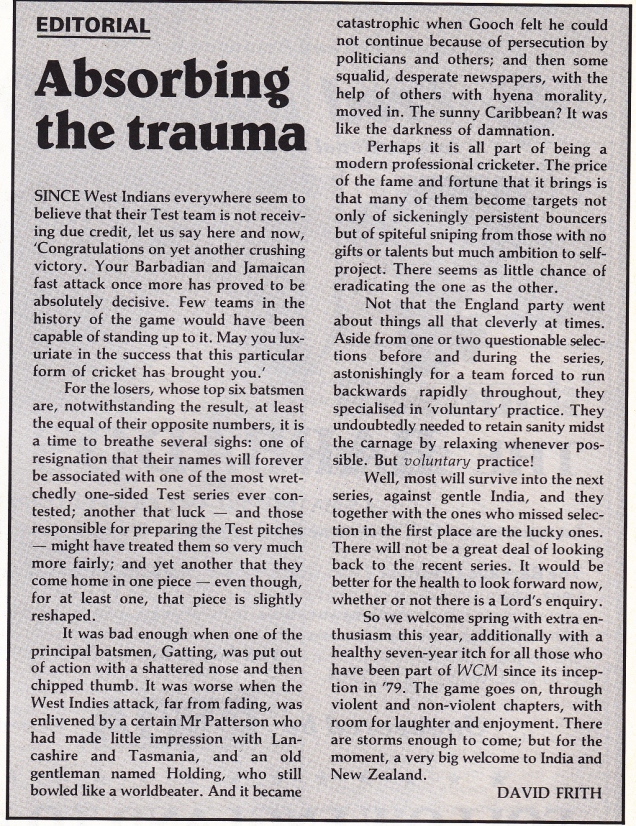
Captain this ship is sinking
Captain these seas are rough, oh yes
We gas tank almost empty
No electricity, we oil pressure reading low
Shall we abandon ship
Or shall we stay on it and perish slow
We doh know, we doh know
Captain you tell we what to do
Gypsy – Sinking Ship
We left the England team a quivering mess. Having been dismissed in Barbados, the series score was 3-0. England faced the fourth test in Trinidad, having lost the second there, and then the finale at St. John’s. The Blackwash was on for a second time. The England team were falling apart at the seams, and morale was at a terrible low. Most of this was centred around the off field relations between Ian Botham and the press. The infamy of this clash is still recalled, because if you play word association with Botham and Barbados, the somewhat less than pristine state of a piece of bedroom furniture generally pops into my mind.

David Gower, in his column in the May 1986 Wisden Cricket Monthly, commented on the allegations..
“To catalogue the list of allegations against Ian Botham would take too long, and the man certainly has had enough strife on the field out here without having to worry about some of the stuff that has filtered back from home or been thrust under his nose by inquisitive hacks phoning through at five in the morning local time.
This is not the place to try to solve these individual bugbears, nor must I give the impression that all this happens every day as a matter of course. In discussion with colleagues and the gentlemen of the Fourth Estate, the concept is emerging of cricketers now becoming more like pop stars in terms of media treatment. John Jackson of the Daily Mirror, when questioned by BBC Sporstnight, quite happily and honestly admitted that extraneous Press interest was going too far, but. equally honestly suggested it will have to be accepted more and more as time goes on. If this pop-star status is to be officially conferred on us, perhaps the TCCB should be warned that we shall need £1m up front plus a share of all album sales before our next “gig ” at Lord’s.”
This was typical Gower and why he lost the press. He didn’t play their game, but also didn’t appear to take the game that seriously. In trying to laugh off what was a bloody awful time between press and players – and yes, today’s players ought to recognise that (and in the context of Pringle’s piece in TCP too) – he didn’t take umbrage in an overt way as he might have to “protect his players”, nor antagonise those “gentlemen of the Fourth Estate”. His rallying cry at the end of the piece is pure Lubo.
“Lest I be accused of ending on too flippant a note, let me just say that as ever we still have work to do out here, and intend to carry on trying.”
Stephen Thorpe, in the same issue of TCM, starts a piece rather over-dramatically but captures the moment:
“He’s gone on record as saying he doesn’t read newspapers any more. If he’d read them over March he’d be close to suicide now. Those who know hims best say he is affected, but rarely ever shows it.
Botham had been accused of taking hard drugs, bedding local “beauty” queens and hardly tasting sobriety throughout. You had to be there at the time to know how vociferous these attacks were, and how big a personality Botham was in the game. It seems scarcely credible now the game is hidden behind a paywall and there is instant news everywhere.
We can study this a bit more at length in due course, but I think we must sum up the final cricket action of the tour.
England may have still been in the ODI competition, but the fourth game of the series was the end of that hope. Played on a wicket described in the B&H Year Book as a “slow wicket”, Tim Robinson took 40 overs over a score of 55, and in the end racked up a score of 165 for 9 in 47 overs. Haynes made 77, Richards made 50, both unbeaten, and the hosts completed a series win in 38.2 overs.

The fourth test started four days after that, and the wicket I recall John Emburey said he was looking forward to bowling on in the hopes a second go around at Queen’s Park Oval might take spin, was not quite what was expected:
“No blame could be attached to the England side for their batting display in the first innings. They asked to bat first on a coarse, green wicket where survival was precarious and life dangerous. It was disgracefully under-prepared for a Test match although, obviously, highly suited to the West Indian pace attack.”
The Almanack was hardly less vociferous…
The pitch, a hotch-potch of thick grass and bare brown patches, was described as the greenest ever seen in Port-of-Spain. It was two-paced, uneven in bounce throughout, and after two days criss-crossed by cracks. On the third morning when, under the supervision of the umpires, groundstaff shaved off an eighth of an inch of grass, the resultant clippings weighed about two pounds. England’s cricket lacked distinction, and not only with the bat, as Thomas’s analysis makes clear. But what remained of their fighting spirit had undoubtedly been diminished by the seemingly calculated nature of the pitch’s preparation.
I do recall the commentators on the radio mentioning how green the wicket was. But England would hardly have wanted a great batting surface, because there had been a few of them in 1984 and it hadn’t made a difference. Perhaps if we bowled well, it might be a leveller? Ha. Wishful thinking.
England made 200, with Joel Garner the pick of the host bowlers, taking 4-43. Robinson was out early for 0, Gooch out for a stodgy 14 an hour and a quarter later, and Gower had preceded him, caught behind. At 31/3, with Big Bird rampaging through the line-up. disaster awaited. A recovery was put in place, as Lamb and David Smith put on 92 for the 4th wicket, with Smith falling for 47, Lamb for 36. Botham added 38, but the tail provided little value added, with our own Rupe making just 7, and England scraped up to 200.
The West Indies, playing on the same coarse wicket, made their innings count. In their score of 312 there was one half-century, made by VIv (87). England looked to have got a foot back in the game after the WIndies passed 200 with just three wickets down, as they took three wickets for 5 runs and the hosts were 249 for 7. A 50 partnership between Harper and Holding took the game away from England, and the deficit of 112 looked too much. One good response though came from Ian Botham who took 5 for 71. This contrasted to his new ball partner, Greg Thomas, who had 101 runs taken off his 15 overs. Viv’s 87 off 11 balls transcended all other efforts, and it would prove to be too much.
England may have had some hope entering Day 3 – a mere 71 behind at the time – but this was extinguished. The Yearbook spares nothing in their view of our performance:
“England now proceeded to give one of their most miserable batting performances in many years as they showed neither technique nor willingness to cope with high class fast bowling. The misery began third ball when Gooch mis-hooked. Robinson, the gap between bat and pad growing each innings, was bowled. Patterson left Gower stranded with quick movement and Lamb fell to a ball which pitched on middle stump and hit the off.
Holding bowled beautifully and had Smith LBW to an inswinger, the batsman offering no stroke. Willey had looked increasingly vulnerable as the tour progressed and, not surprisingly, fell to Marshall. Botham was taken at cover, and Emburey lost his off stump. Garner accounted for Foster and Thomas.
England were all out in 38 overs….”
Here’s the Almanack summary…
Once Gooch, hooking, top-edged the third ball of the innings straight up in the air, England never looked like overcoming their deficit of 112. Robinson, bat crooked and far away from body, was bowled off the inside edge for his fifth single-figure score in six innings in the series; Gower was adjudged lbw when he turned his back on a short ball, bowled over the wicket, which kept low; Lamb was beaten by a great delivery from Patterson which pitched on middle stump and struck the top of off. Hard enough to play in conditions favouring the bat, as in 1984 in England, the quality of West Indies’ pace quartet made for something less than gripping contests on pitches such as this.
England were bowled out for 150, and the West Indies polished off the 39 required in 5.5 overs to go 4-0 up. Desolation. Beaten inside three days, it just meant we had longer to wait in between times for the final coup de grace. Off to Antigua and to another Blackwash. Surely.
Gower had received a nasty blow in the second innings of the 4th Test and only made himself available on the day of the 5th Test. David Smith, who had top scored in both innings for England in Trinidad, was ruled out with a back injury, and Gatting, back from both injuries, returned.
B&H showed our mindset:
“The England management had rightly complained to the West Indian authorities about the pitches on which they had been asked to play the Test Series for they were invariably wickets on which the bounce was uneven.”
We were a bunch of bloody moaners then too.
Gower won the toss on a belting wicket at St. John’s (plus ca change) and then decided to put the hosts in, believing the only opening you might get would be early moisture. That proved optimistic and our bowling and fielding did not back up that insertion. Botham dropped Haynes off Foster when he was on 2, and dropped again off Emburey when on 38. Dessie went on to make “a sober hundred”. Haynes made 131, but again the West Indies top order didn’t fire fully, with Greenidge (14), Richardson (24), Gomes (24), Richards (26) and Dujon (21) all getting starts and all getting out. West Indies were 281 for 6 when the top order had gone, but this was the start of the malaise in this match.
The lower order launched “a violent attack”, and took the game away. Malcolm Marshall made 76, Roger Harper 60 and Michael Holding made 73. 474 all out after a barrage of shots and a dispirited England looked set to lose by an innings again. After all, who gave us an earthly of making it to 275 to avoid the follow on?
But England did. They started really well, with a century opening stand. Wilf Slack and Graham Gooch both made half centuries as we reached 127 for 0. Both fell in the space of five runs, and it was then left to the Captain of the Sinking Ship to try to avoid the rocks as he made England’s highest individual score of the test series. His 90 took us past the follow-on early on Day 4, and there was, at least, a sigh of relief. Maybe a draw could be established. They passed 275 with seven down, and then eked out another 20 after Gower left the scene to finish on 310, and a deficit of 164. The Yearbook made another point…
“Marshall then subjected Foster to some unwarranted, unnecessary, uncensured and vicious short pitched bowling accompanied by the fast bowler’s glare, as England added 20 for the last week.”
We didn’t half moan.

What followed was the stuff of legends. England had one aim in mind, to contain and delay the declaration. The West Indies had one aim in mind, to score, and to score quickly. Greenidge had been injured and so Richardson opened with Haynes. They put on a brisk century partnership, before Richardson fell to Emburey for the sixth time in succession. In hindsight getting out the son of Viv probably wasn’t our wisest idea. For in strolled the Masterblaster. 56 balls faced later, and one of the longest standing records in test cricket had fallen. Jack Gregory had made the previous fastest test century in 67 balls in 1921-22 against South Africa. Viv raised the bar.
“From the second ball he received Richards hit a six.”
“From 35 deliveries he made 50.”
“From the next 21 deliveries he made another 50.”
“The massacre of the England bowlers ended when he declared after reaching 110 from only 41 scoring strokes.”
“…did not play a false stroke in an innings which intoxicated his home crowd and stunned his opponents who could only pay homage in awe at the man’s brilliance.”
Wisden was equally as fulsome:
“Richards’s display, making him the obvious candidate for the match award, would have been staggering at any level of cricket. What made it unforgettable for the 5,000 or so lucky enough to see it was that he scored it without blemish at a time when England’s sole aim was to make run-scoring as difficult as possible to delay a declaration. Botham and Emburey never had fewer than six men on the boundary and sometimes nine, yet whatever length or line they bowled, Richards had a stroke for it. His control and touch were as much features of the innings as the tremendous power of his driving. As can be calculated from the following table, he was within range of his hundred six balls before completing it (with a leg-side 4 off Botham), while from the time he reached 83 off 46 balls there had been no doubt, assuming he stayed in, that he would trim several deliveries off J. M. Gregory’s previous record of 67 for Australia against South Africa at Johannesburg in 1921-22. The full innings went: 36126141 (24 off 10) 211 412 1 (36 off 20) 112 2111 (45 off 30) 1 1624441 (68 off 40) 12 664612 (96 off 50) 21 461 (110 off 58).
Plundered in 83 minutes out of 146 while he was at the wicket, it had to be, by any yardstick, among the most wonderful innings ever played.”
England showed real signs of distress, and in the short period of play that remained that day Wilf Slack was bowled and Robinson run out (ending a wretched tour for one of my favourite players of the day) to leave England 33 for 2.
I remember little of the hundred other than its sheer inevitability. I was at school, it was a Tuesday, and coming home the carnage was starting. I didn’t listen to it. I couldn’t. Richards was a majestic player, and watching him was something else, but listening to him tearing us apart was not something I wanted to subject myself to. Viv was Viv. Nothing else to say.
England commenced Day 5, almost an achievement to savour, with defeat not a total inevitability. Likely, but not inevitable. Gooch was there, our only international centurion of the tour. Richard Ellison was nightwatchman, and he’d shown stickability in the first of the two tests in Trinidad. Gower had made 90 in the first innings. Gatting might be able to get some form back in time to salvage a horrific experience.
And it started really well. Ellison stuck with Gooch until nearly lunch. Ellison fell, having been out there for two hours and faced 76 balls. The pitch had a little bit of low bounce, but no real demons. England might do it. Then Gooch fell shortly after lunch, and the house of cards collapsed thereafter. Gower made 21, but Lamb and Gatting went for one run each. Botham reined himself in, but the game was slipping away. Wickets fell. 84 for 2 subsided to 124 for 6 and the game was up. When Downton, who according to the Yearbook “had been lucky to hold his place throughout the series” (truly a difficult winter), was dismissed, LBW to Marshall (there’s a difference between the Yearbook and Wisden as to who the last man out is – Yearbook seems to suggest it’s Emburey, Wisden says Rupe. Rupe fits the story the best), the second Blackwash was complete.
We will finish the story in a wash-up, but let me give you a taste of what is to come. David Frith in WCM wrote this, I think, mid-series. It sums up the age very well.

Brilliant stuff Dimitri. Have really enjoyed your posts on this series.Everything was different back then!!!!
LikeLike
Oh…my…. such a wonderful read and brings back such great memories of Test cricket at its most invigorating… just two Q’s…. who was ‘our own Rupe’? and was VIv’s ’87 off 11 balls’ worthy of a Gayle like interview? lol – cheers, m’dear for bringing much needed smiles.
LikeLike
Was it Neil Foster?
LikeLike
Rupe is Paul Downton. As in his middle name.
LikeLike
Thank you. Thoroughly enjoyed every episode of this. As for:
“The losers, whose top six batsmen were at least the equal of their opposite numbers.”
Sounds like David Frith, not Ian Botham, should have been banned for cannabis use. That’s some strong stuff he was on there.
LikeLike
Of course the actual quote is “are” not “were”, and there’s an important sub-clause “notwithstanding the result of the series”. “Were” would simply render the sentence nonsensical. But “are” has to be the most insupportable, preposterous thing I’ve read in a cricket article for many a year.
LikeLike
That’s not the most preposterous thing written in that WCM. I give you Evelyn Maitland Wellings:
“Not long ago a judge held that a victim of rape was in part responsible for her ordeal by reason of hitch-hiking. How very much more obviously is a batsman guilty of “contributory negligence” by going out in armour plating.”
Staggering.
LikeLike
Richards, Haynes, Greenidge and Richardson versus Gooch and Gower: so Frith was being optimistic, but Lamb and Willey had reasonable records against the WIndies, so perhaps not so far-fetched.
LikeLike
I am not looking up the scorecards but were the other 2 Windies, Gus Logie and Everton Mattis? If so, Frith had a point.
LikeLike
Larry Gomes, who had had a great series in England in 1984 and Jeffrey Dujon at six. Carlisle Best played the first three tests. Harper replaced him in the final two.
LikeLiked by 1 person
Those pitches?
When the decision was made to raise the mower blades a fraction in order to promote the excellence of West Indies seamers in their own conditions and the paucity of England’s technique, opprobrium rained down. This was pitch doctoring apparently.
LikeLike
Sorry to lower the tone of the discussion here, but you’re the one that posted the photo of Gower on the yatch. He’s very, very scrumptious.
LikeLike
Lubo’s budgie smugglers could no doubt tell a few cracking yarns.
LikeLike
So, Richards apart, the top orders were kinda equivalent, especially if you consider what Robinson had just done against Australia.
LikeLike
I am assuming that by “top six batsmen”, Frith meant the full-strength sides, i.e. Greenidge, Haynes, Richardson, Richards, Gomes, Dujon v Gooch, Robinson, Gower, Gatting, Lamb, Botham.
At the start of the Blackwash series of 1985/86:
Greenidge averaged 49 after 66 Tests and Haynes 39.92 after 54 matches. They were the best opening pair in the world and only one pair has touched them since. Greenidge had made two double hundreds the last time West Indies played England. Every member of that West Indian top six apart from Richardson had made at least one hundred in the 1984 Blackwash.
Gooch averaged 37.83 after 48 matches, though at least he had two hundreds against WI the last time he played them… five/six years ago. He’d played six Tests in the last four years, and had managed only two fifties and (in his last innings) a hundred. Sure, Robinson averaged 62 after filling his boots with 11 Tests against India and a weak Australia. But how this is remotely comparable to Greenidge and Haynes I don’t know. Frith doesn’t qualify on the basis of recent form, he simply says that England’s top six are “at least the equal” of their opposite numbers.
Richards, averaging 54.02, was obviously a man apart. Gower was closest at 45.63 (and he had a hundred in the West Indies).
As for the rest:
Richardson (46.04) was averaging more than Gower, though he’d played only 15 Tests. Gomes averaged 43.70 after 49 matches. And Jeff Dujon was averaging 44.10 after 33 matches!
Compare that to England: Gatting on 37.83, though he was worse than useless last time he played WI and his Test average had been 23.83 at the time. Lamb had a terrific record against WI, but still averaged only 38.12 and still hadn’t made a hundred outside England. Botham was on 36.13 but hadn’t made a century in 15 Tests over more than two years, and hadn’t made a hundred against WI in his entire career.
I contend that no-one who wasn’t English would even have entertained constructing that sentence in spring 1986, let alone allowed it into print. I’d go further and say that only someone as mean-spirited as Frith (with regard to that West Indian side, see the Fire of Babylon extras for evidence) would have written it.
(and any quibbles about Carlisle Best playing instead are negated by Wilf Slack and David Smith, I would have thought)
LikeLike
Frith had form with the West Indies. However, I have an editorial on the West Indies by a respected England captain and broadcaster that is the epitome of whingeing.
The contrast between their bleating when we were getting thumped, and the eulogies for Malcolm Marshall when he passed away is striking. Were they talking about the same bowler and his modus operandi?
LikeLike
What happened to Patrick Patterson?
http://archive.indianexpress.com/news/the-curious-case-of-patrick-patterson-gone-awol/1138862/
(Hopefully, on the right thread this time).
LikeLike
As ever a great article and the comments too to are so informative.
LikeLike
NorthernLight spotted this sentence in a Guardian piece on the WT20:
“For a variety of reasons Chris Gayle has faced only two deliveries since starting the tournament by pumping a century against England, though he will always havecan win a match off his own bat.”
He quoted “will always havecan” and made a remark about employing subs.
The post has been moderated…
… yet “will always havecan” remains uncorrected.
The Guardian in a nutshell, everyone.
LikeLike